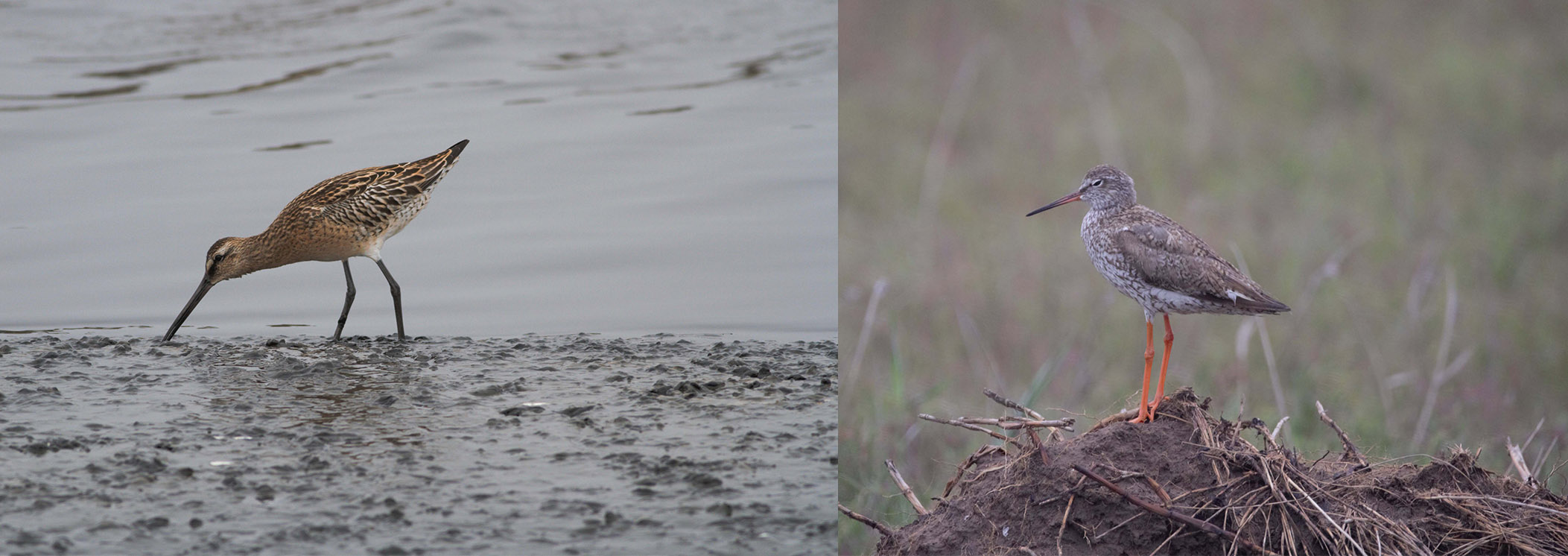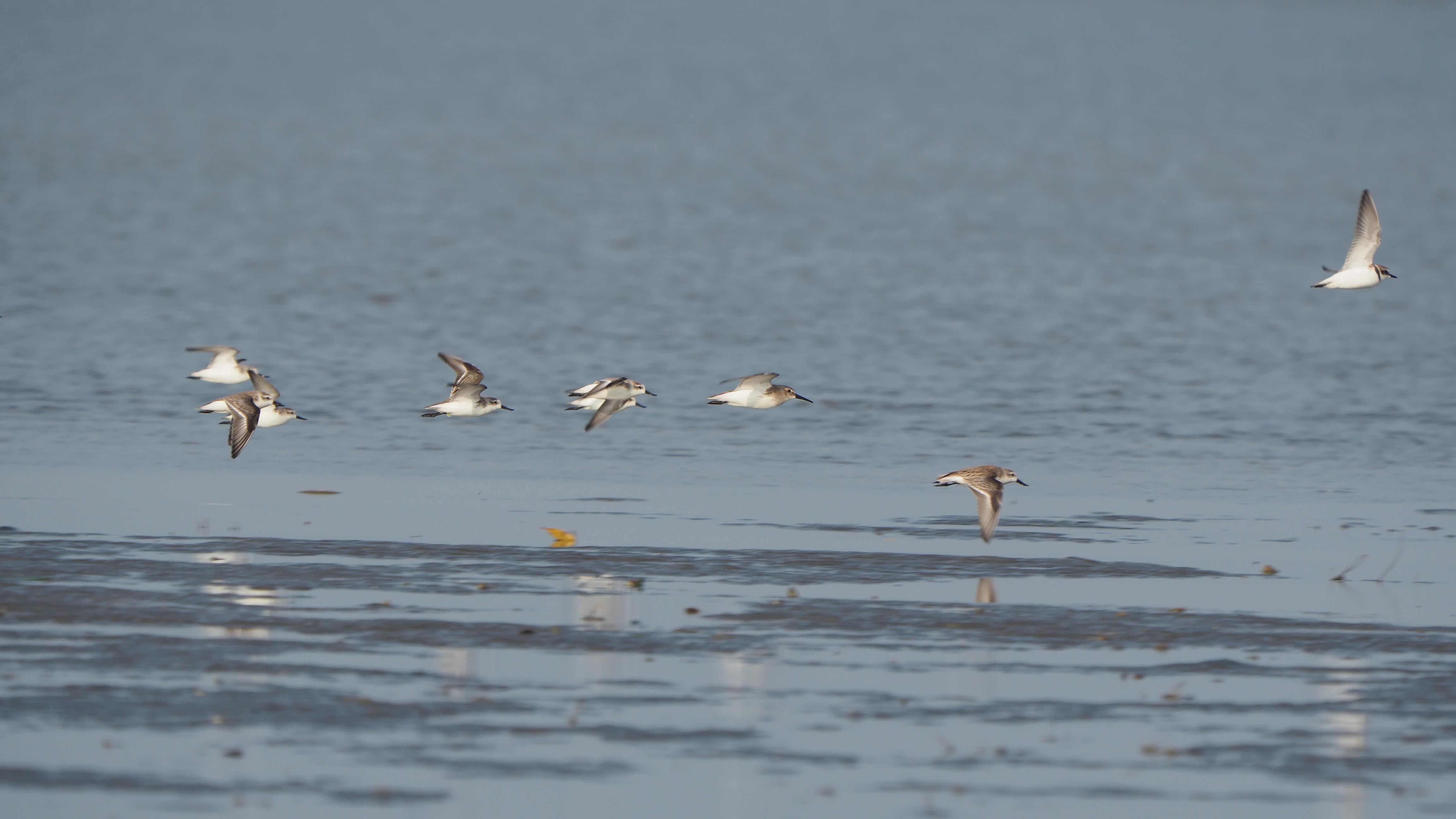Most bird lovers usually opt for parks or forests but Zhang Chen prefers the mudflats of the eastern coastline of China.
"When you see a mudflat, it is often empty with nothing. But in certain seasons, it will gather a great number of shorebirds," said the Beijing native who's traveled to Rudong County in Jiangsu Province to watch these birds.
Spring and autumn are the best seasons for watching birds, especially migratory ones. "When you see tens of thousands of waders gathering together, it's a magnificent view."

A snapshot from Zhang's single-tube telescope in Rudong County, Jiangsu Province, China, October 2021. /Zhang Chen
A snapshot from Zhang's single-tube telescope in Rudong County, Jiangsu Province, China, October 2021. /Zhang Chen
Shorebirds refer to multiple bird species who live in wet, coastal environments. They are also called waders thanks to their long legs that allow them to wade through mud and sand for food.
China has 1,491 different kind of birds on record. As an avid bird lover, Zhang has spotted over half of them, and observing waders remains a fascinating activity.
"Looking at their behavior is very funny as the waders keep poking their beaks into the mud randomly," said Zhang.

A long-billed dowitcher and a common redshank (L), Tangshan City, Hebei Province, July 2016. /Zhang Chen
A long-billed dowitcher and a common redshank (L), Tangshan City, Hebei Province, July 2016. /Zhang Chen
"Identifying these waders is also very interesting because some species look very alike," he added.
Zhang can easily tell the name of a bird just by its sound, plumage or beak shape.
Many waders are migratory birds, such as the great knot (Calidris tenuirostris), the spoon-billed sandpiper (Calidris pygmaea) and the Far Eastern curlew (Numenius madagascariensis). They pass though the eastern coast of China to rest and refuel on food. Wherever these birds are, Zhang and his friends make sure to be there.

Flying dunlins and spoon-billed sandpipers in Leizhou City, Guangdong Province, December 2019. /Zhang Chen
Flying dunlins and spoon-billed sandpipers in Leizhou City, Guangdong Province, December 2019. /Zhang Chen
Zhang travels lightly. No heavy cameras and tripods, just a single-tube telescope.
"I used to take my photography gear with me, but it's just too tiring," said Zhang, laughing. "And since others can took better pictures, why would I bother myself?"

Zhang Chen and his friends walking on the mudflats. /Zhang Chen
Zhang Chen and his friends walking on the mudflats. /Zhang Chen
Habitat loss is one of the biggest threats to shorebirds and many species are facing a real survival crisis. The spoon-billed sandpiper is listed as "critically endangered" on the IUCN Red List, the Nordmann's greenshank and the great knot are already "endangered."
Zhang and his friends go beyond appreciating the species they watch to learning about them.

Day and night views of two different mudflats in the same area, Rudong County, Jiangsu Province, October 2021. /Zhang Chen
Day and night views of two different mudflats in the same area, Rudong County, Jiangsu Province, October 2021. /Zhang Chen
Bird banding is one way to understand birds' behavior but shorebirds have good eyesight, so attaching the tags has to be done at night.
Zhang and his friends set up nets around the birds' resting area around 8 p.m. and then wait for a bird to wander into it. The net is soft enough that it won't hurt the birds and the tracker is light enough so they can safely continue their migration journey.
Despite working for several nights, only three trackers were successfully fitted around the birds' legs, and dozens of the devices were broken in the process.

Zhang Chen is a bird lover who works at Shanshui Conservation Center, a Chinese NGO dedicated to species and ecosystem conservation. /Zhang Chen
Zhang Chen is a bird lover who works at Shanshui Conservation Center, a Chinese NGO dedicated to species and ecosystem conservation. /Zhang Chen
Driven by his passion for nature, Zhang is now working at a Chinese NGO that focuses on the environment.
When asked how ordinary people can help protect birds, Zhang said, "just go watch birds, because if more people join birdwatching groups, their habitat will be protected."
For more:
Bird lover's journal: 'It's pretty much like sniping'
Bird lover's journal: Discovery of bee-eater couple raises questions
Bird lover's journal: The beauty lies in uncertainties
Bird lover's journal: 45 bird species in two days is just not enough
(If you want to contribute and have specific expertise, please contact us at nature@cgtn.com.)

